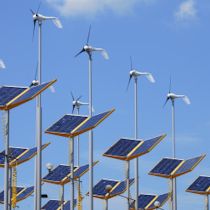 On Wednesday, June 21, a Virginia State Corporation Commission (“Commission”) Hearing Examiner issued a report recommending denial of a renewable energy tariff (“Green Tariff”) filed by Appalachian Power Company (“APCo”). If accepted by the full Commission, the Hearing Examiner’s findings would be a victory for renewable energy developers and competitive energy suppliers operating in Virginia.
On Wednesday, June 21, a Virginia State Corporation Commission (“Commission”) Hearing Examiner issued a report recommending denial of a renewable energy tariff (“Green Tariff”) filed by Appalachian Power Company (“APCo”). If accepted by the full Commission, the Hearing Examiner’s findings would be a victory for renewable energy developers and competitive energy suppliers operating in Virginia.
APCo’s application requested permission to offer a voluntary 100% renewable tariff to its customers. APCo proposed to repackage generation it was already purchasing via four power purchase agreements (“PPAs”), and then reallocate that energy to participating customers. Customers would pay an 18% premium in order to participate in the program.
The so-called Green Tariff would represent the first time a Virginia utility offered a 100% renewable tariff option for its customers. But, if approved, the tariff would also largely foreclose competition for renewable energy in Virginia and prevent customers from purchasing generation from competitive suppliers. Under current law, most customers are allowed to purchase renewable energy from third-parties only if their incumbent electric utility does not have an approved tariff for 100% renewable energy. See Va. Code Section 56-577(A)(5).
Environmental and renewable energy advocates, including our client, the Maryland-DC-Virginia Solar Energy Industries Association (“MDV-SEIA”), opposed APCo’s proposed Green Tariff. MDV-SEIA argued that the proposal is not in the public interest and should be rejected for several reasons. First, the per-MWh price of the Green Tariff is unreasonably high and not reflective of current prices for renewable energy. MDV-SEIA also noted that the Green Tariff does not contain any solar generation or any Virginia-based renewable resources of any kind. The four PPAs that form the basis of the Green Tariff represent wind and hydrologic energy located in Indiana and West Virginia. Moreover, the Green Tariff would not encourage the development of any new resources; all of the Green Tariff’s out-of-state facilities were placed into service between 7 and 15 years ago.
The Hearing Examiner largely agreed with the arguments raised by MDV-SEIA, finding that the “per MWh cost of the [proposed tariff] is significantly higher than the average cost for new wind power in the PJM region” and that the tariff rate would be “18% higher than APCo’s standard rate for service.” The Hearing Examiner also cited data, obtained by MDV-SEIA through a motion to compel, indicating that the Green Tariff price was significantly higher than other renewable energy recently added to APCo’s portfolio. Finally, the Examiner noted that the Green Tariff “has the potential to suppress or even curtail customer access to 100 percent renewable energy by precluding sales by [competitive renewable energy suppliers] while at the same time offering an incumbent utility alternative that is simply too costly for customers to bear.” The Hearing Examiner determined that the Green Tariff, if approved, would not support the clean energy objectives of the Commonwealth’s Energy Policy, found in Title 67 of the Code of Virginia.
The Hearing Examiner’s report and recommendation now goes to the full Commission, which can approve or reject it. The Commission is also currently considering a similar renewable tariff application filed by Dominion Energy Virginia (“Dominion”) in Case No. PUR-2017-00060. If approved, Dominion’s tariff would also severely limit energy choices for most of its customers.
Please contact one of our renewable energy lawyers or regulatory attorneys should you have questions about this case. The Commission case number for this matter is PUE-2016-00051.



No Comments